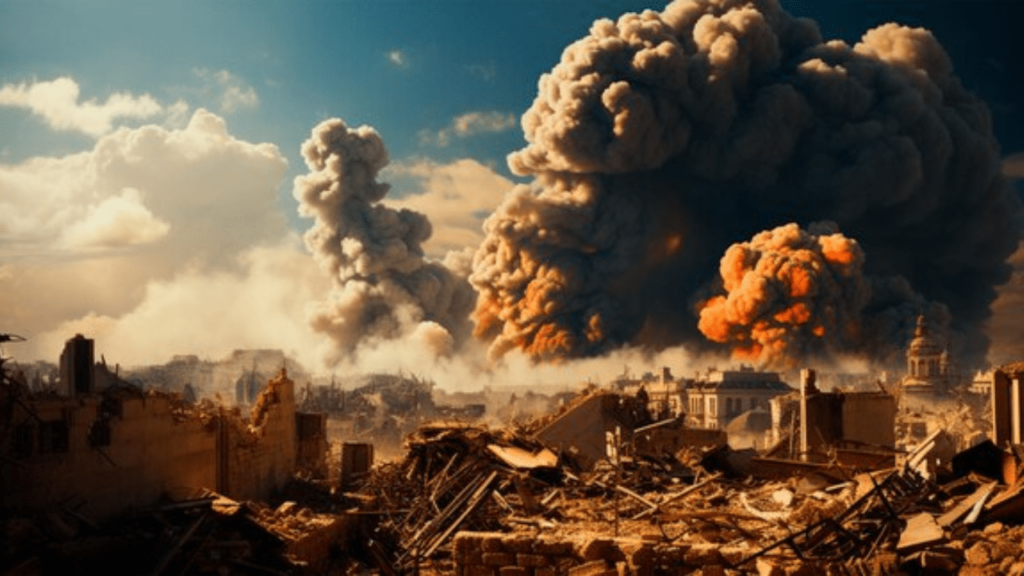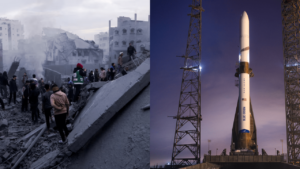The Middle East conflict has once again intensified with recent events pushing tensions to critical levels. The Middle East is a region where the actions of one country can have ripple effects across the entire world.

The Middle East is now seeing a new wave of violence and uncertainty as a result of the situation’s further escalation. Tensions have escalated to a critical point attracting a number of people and eliciting a range of responses from around the world.
Background of the Conflict
Due to a confluence of historical grievances, geographical disputes, religious tensions, and international interests, the Middle East has been a flashpoint for conflicts for many years. Early in September 2024, tensions between regional actors erupted in response to disagreements over resource management and territorial invasions, sparking the most recent phase of escalation. Armed groups and government forces are engaging in cross-border gunplay, involving both state and non-state entities.
Israel and Lebanon have been the main parties to the conflict; there have been allegations of rocket launches and cross-border shelling between Hezbollah and the Israeli Defense Forces (IDF). Furthermore, because of proxy wars and Saudi Arabia’s influence over nearby nations like Yemen, Syria, and Iraq, tensions between Iran and Saudi Arabia have also increased.
Recent Updates
A rise in hostilities Between Hezbollah and Israel
The confrontation between Israel and Hezbollah has been much more intense within the last week. Hezbollah fired a flurry of missiles into northern Israel on October 1st, hitting both military and civilian targets. The Israeli Defense Forces responded by attacking Hezbollah positions in southern Lebanon with missiles, causing extensive damage and killing civilians.
Fears of a wider confrontation involving Lebanon have increased due to the cross-border fighting, as both sides have threatened to escalate hostilities further if they don’t stop. The Lebanese government has called on the international community to step in and mediate as citizens there have started to evacuate areas close to the Israeli border.
Escalation of Saudi-Iran Tensions
In the meantime, there is now a boiling point in the tensions between Saudi Arabia and Iran. Drones are said to have targeted a Saudi oil complex in the Eastern Province on October 3. Saudi authorities have linked this incident to the Houthi rebels in Yemen, who are backed by Iran. The attack caused to a brief disruption in global oil supply, driving up prices and sparking condemnation from the United States and European Union.
Although Iran has denied any participation, Saudi Arabia has threatened to take “all necessary measures” to safeguard its sovereignty, and the episode has heightened tensions already present. An emergency meeting has been scheduled by the Gulf Cooperation Council (GCC) to discuss a coordinated response to the perceived threat posed by Iran.
Humanitarian Crisis in Gaza
The humanitarian situation in the Gaza Strip has also drastically gotten worse. In response to rocket fire from Gaza, Israeli forces initiated a massive military operation on October 2nd, targeting armed organizations’ infrastructure. The offensive has resulted in dozens of casualties, including civilians, and has aggravated the already severe humanitarian conditions in the enclave.
The UN has demanded an immediate cessation of hostilities and caution from both sides. According to aid organizations, food, clean water, and medical supplies are running dangerously low in Gaza. If hostilities continue, there is growing fear that a humanitarian catastrophe may break out.
International Reactions
The world community has responded fiercely to the latest escalation in the Middle East. The US has stated that it supports Israel’s right to self-defense but that everyone should exercise caution and restraint. In an effort to stop more bloodshed, President Biden has also offered to arbitrate negotiations between Israel and Lebanon.
The European Union has underlined the necessity of a diplomatic settlement to the dispute and demanded an immediate end to violence. In an effort to mediate a brief ceasefire, France in particular has been actively contacting Lebanese and Israeli officials.
Russia has demanded a stop to Israeli airstrikes and denounced the attacks on Lebanon. Additionally, Moscow has volunteered to arbitrate negotiations between Saudi Arabia and Iran, highlighting the need to maintain regional peace and averting additional disruptions to the world’s energy supplies.
In an extraordinary meeting to address the current issue, the Arab League’s member nations have expressed support for Lebanon and denounced Israeli activities. But there are also disagreements inside the League about how to handle the larger regional hostilities that Saudi Arabia and Iran are involved in.
Impact on Regional Stability
The stability of the region is significantly impacted by the current escalation. Israel and Lebanon’s cross-border violence runs the possibility of attracting other parties, such as Syria, which has complicated ties to both Israel and Hezbollah. Any further escalation might lead to a bigger confrontation, involving numerous countries and potentially pulling in global powers.
Considering their influence over proxy groups throughout the region, the growing tensions between Iran and Saudi Arabia are also cause for concern. Direct conflict between these two giants may have disastrous effects on the world economy and energy security worldwide, in addition to the Middle East.
The humanitarian catastrophe in Gaza is increasing pressure on both Israel and Hamas, which is making peace attempts even more difficult. As things in the enclave get worse, there may be a chance for another full-scale struggle, much as in the past, which has resulted in extensive damage and casualties.
Global Reactions and Potential Solutions
The world’s response to the escalation in the Middle East has been divided; some nations have called for moderation and communication, while others have chosen sides, making efforts to defuse the situation more difficult. The UN has urged all sides to resume talks and demanded an immediate ceasefire, but reaching an agreement is still very difficult.
A solution to the situation may depend on the participation of superpowers like the US, Russia, and the EU. There are ongoing diplomatic efforts, with a number of nations attempting to arbitrate negotiations between the disputing parties. A diplomatic breakthrough seems improbable in the near future, though, given the deep-seated grievances on all sides and the lack of trust between them.
One possible answer is to refocus on the larger reasons underlying the conflict, such as territory disputes, resource control, and political recognition. In order to encourage compromise and promote discussion on these matters, the international community may be able to help. Furthermore, resolving the humanitarian catastrophe in Gaza should be a top priority, with more supplies and support for civilians.
Looking Ahead
The Middle East conflict has once again reached a critical point, with multiple flashpoints threatening to spiral out of control. The escalation between Israel and Hezbollah, the rising tensions between Saudi Arabia and Iran, and the worsening humanitarian crisis in Gaza all point to a region on the brink of further chaos.
The global reactions have been varied, with calls for restraint and offers of mediation contrasting with expressions of support for one side or another. The path to peace remains fraught with challenges, but continued diplomatic efforts and a focus on addressing the underlying causes of the conflict are essential for preventing a full-scale war.
The necessity for global communication and cooperation is more important than ever as the situation continues to change. We are at a turning point in the Middle East’s history, and how we proceed in the next few days and weeks will either accelerate or slow the pace of violence.
Read Next:

The Psychology of Love: Why Valentines Day Matters More Epic Than You Think
Discover the psychology of love and why Valentines Day is more important than you think. Learn how love impacts the brain, strengthens relationships, and boosts

Premier League Highlights: Arsenal Humiliate Man City 5-1, Spurs and Palace Secure Crucial Wins
Arsenal demolished Manchester City 5-1 in a statement premier league highlights win, reigniting their title hopes. Meanwhile, Crystal Palace stunned Man United 2-0, and Tottenham

How Budget 2025 Impacts the Indian Middle-Class: Major Tax Benefits and Glaring Omissions
Budget 2025 offers major tax relief to the middle class, including zero tax on incomes up to ₹12 lakh. However, it misses out on incentives

Degrees vs Employability: Why “Highly Qualified Degree Holders” Struggle to Find Jobs While “Less Qualified Individuals” Get Hired Faster!
Many highly qualified individuals struggle to secure jobs, while less qualified candidates get hired quickly. This Degrees vs Employability paradox is caused by employer preferences,

The Power of Mindset: Why Looking Poor Doesn’t Make You Poor, but Thinking Poor Does!
Discover why looking poor doesn’t define your wealth but thinking poor does. Learn the power of mindset and how a growth-oriented mindset can lead to

Overthinking: How It’s Damaging Today’s Youth – Causes and Cure in 2025
Understanding how overthinking is silently damaging today’s youth, from its causes rooted in societal pressure and social media to its long-term effects on mental health.

Netaji Subhash Chandra Bose: An Epitome of Epic Leadership
Discovering the incredible life of Netaji Subhash Chandra Bose, a leader whose vision, courage, and determination redefined India’s freedom struggle. Explore his leadership qualities, ideology,

Global News Headlines Today: From Gaza Ceasefire to Blue Origin’s Massive 2025 Milestone
Explore today’s top global news headlines, from the Gaza ceasefire and Blue Origin’s historic spaceflight to Apple losing its top spot in China’s smartphone market.
